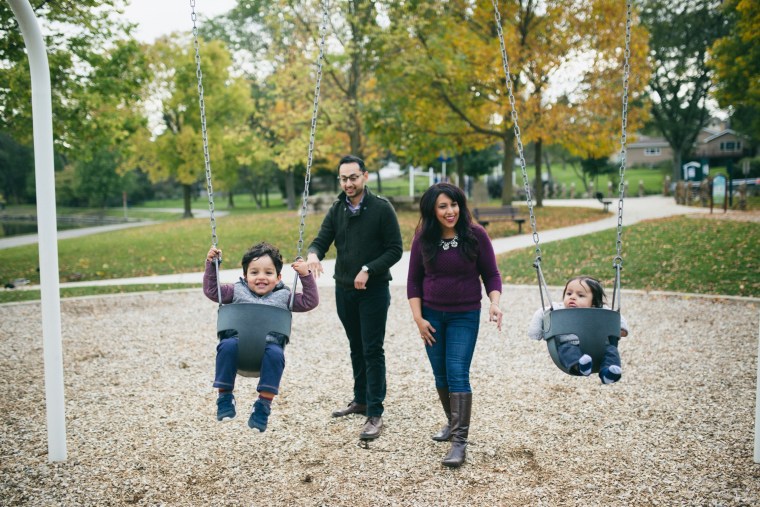Everyone benefits when dads take paternity leave. Fathers get to bond with their new baby, there’s a decreased risk of mom getting postpartum depression and it shifts the perception that caregiving is a female’s responsibility. There are plenty of business and economic reasons too. Mothers make about $16,000 less per year than fathers, but for every month of paternity leave a father takes, the mother’s income increases by 6.7 percent.
However, of the 41 countries that comprise the Organization for Economic Co-operation and Development (OCED), the U.S. is the only country that does not mandate paid parental leave.
Even without a government mandate, more companies in recent years have announced extended paternity leave benefits. Take, for example, Netflix, which offers an entire year of paid leave for both mothers and fathers. Or Microsoft, which only partners with vendors and suppliers who offer at least 12 weeks of parental leave. Amazon now even offers paid leave for spouses who don’t work for the company.
RELATED: 6 companies redefining parental leave
The catch, though, is that the policies are only useful if workers, especially men, take advantage of them.
The median paternity leave for new dads is just one week, according to a 2017 Pew survey. And a Boston College study found that less than half of dads who were offered six weeks of paid paternity leave actually took the whole six weeks.
Corporate pressure (real or imagined) keeps some workers from accepting these benefits, making those newborn months unnecessarily difficult for the parent on the home front. Taking leave has a ripple effect for moms. According to an analysis of census data by the non-profit advocacy organization National Women’s Law Center in 2018, mothers made $16,000 less per year than fathers.
Joanne Lipman, author of "That's What She Said: What Men and Women Need to Know About Working Together," told Know Your Value, “A senior executive at a major consulting firm said to me, ‘We believe in a generous paternity policy. We encourage it. But in the middle ranks, we have managers giving guys the side-eye. The message isn’t trickling down.'” Lipman firmly contended that making paternity leave mandatory could help close the pay gap by helping to equalize gender roles and income.
Know Your Value spoke with three dads who were among the first to accept generous parental leave benefits from their companies to see how they, their families and co-workers reacted to the experience.
How did you make your decision?
The decision was easy for Chicago-based Mrugank Desai. He and his wife both work for Deloitte and travel the vast majority of the time. Just a month before the birth of their first son, Deloitte announced a 16-week leave benefit for new parents, regardless of gender. Desai said, “Prior to that announcement, we were almost packing our bags. One of us would have been forced out of a job because we couldn’t both sustain the travel.” Both he and his wife used the full benefit offered … and they both used the benefit again when their second son was born just 18 months later. They staggered their leave time so one of them would be at home while the other traveled.

Scott Davis was also one of the first in his office to accept eBay’s paternity leave benefits. Davis, who lives in the New York City area, was granted 60 days leave to be used intermittently over the first 12 months of his child’s life. Davis decided to take four weeks off initially to “take care of my wife as she recovered and to spend as much time with our son as I could.” He then took off one day a week for eight months to make childcare easier while his wife ran her own business.
Fernando Rodas, a manager of operations for a D.C.-based media company, had only been working for 11 months when his oldest child was born, so he didn’t qualify for benefits, which he noted “weren’t amazing” at that time. Prior to the birth of his second child, a new vice-president of human resources implemented a three-month, fully paid paternity leave benefit, and Rodas decided to take the whole benefit in one chunk. He said he might have been a little more hesitant to take the benefit if it had been available the first time around, but for his second child, he said, “It wasn’t a hard decision. This is a benefit that is offered and I’m going to take it. I earned it.”
Did you get pushback for taking leave?
When a dad-to-be starts thinking about stepping away from the office for a significant chunk of time, he might start to worry about how his absence may look to his co-workers. But none of the three dads had major pushback from their managers or co-workers in accepting paternity benefits. Since Davis was one of the first in his office to take advantage, other dads have sought his advice on navigating leave. He said, “I was surprised at how much everyone wanted to hear about it. They were all very excited for me and our family, and I ended up feeling closer to my teammates.”

Rodas said that his co-workers were also extremely supportive. Desai noted that even if dads do get some pushback initially, “it’s important to explain how important this is to you. I’ll never regret having taken that leave. Yes, it temporarily took me out of my career, but experiencing those milestones is something I’ll never regret.”
What did you do on leave?
Rodas took leave to spend time with his newborn, but found his relationship with his 2-year-old son deepened, as well. He often occupied his son so that his wife would be able to focus on their baby girl. Davis noted that he spent a lot of his leave taking pressure off his wife by doing things like diaper changes. He said, “It’s a great way for dads to bond with their kids. My son also felt closer to me, knowing I could take care of and nurture him, too.”
Desai was the full-time caregiver on his two paternity leaves while his wife travelled. He noted that he was often the only dad at community classes and events. The more he talked to other parents, he said, “the more I realized how lucky I was to have this time with my sons. I can say with the utmost confidence that I haven’t missed a single milestone—the first time they walked, talked, babbled.”

How did it affect your home life?
Because Davis and his wife had this time to divvy up the household duties, he said, “I am more able to support my wife if she needs to go on a business trip. We’ve been able to have a more equitable partnership.” Similarly, Desai described the “equally important role that the dad has to play” in the household. He said, “It’s very important for dads to play this role, both for their satisfaction and to demonstrate their commitment to their significant other. My wife appreciates that I’m able to make the commitment.”
Rodas agreed. “My wife was ecstatic,” he said. “She runs her own business and was able start doing phone sessions with her clients sooner than she thought because I was there to help with childcare.”
What advice would you give to dads who are hesitant to take leave benefits?
These fathers have already dispensed paternity leave advice to their co-workers, mainly highlighting their insistence that dads take the full leave they’re entitled to.
Davis said, “I would suggest bringing it up to your manager to plan around it. With enough time, we were able to plan work and projects in a way that our team was not affected. I also think you should talk about it with co-workers when you can. If we don’t use the benefit, it may go away.” Desai urged new dads to speak up about their intentions as soon as possible. He said, “The earlier you set expectations, the better.” He added, “Having gone through it, I would never wish for any other dad to leave that benefit on the table.”
When Rodas talks to soon-to-be dads, he says simply, “You need to take this leave. You’re not going to get that time back. You can always start a new job; you can’t restart the first few months with your child. Things are not going to change unless guys take the benefit.”
